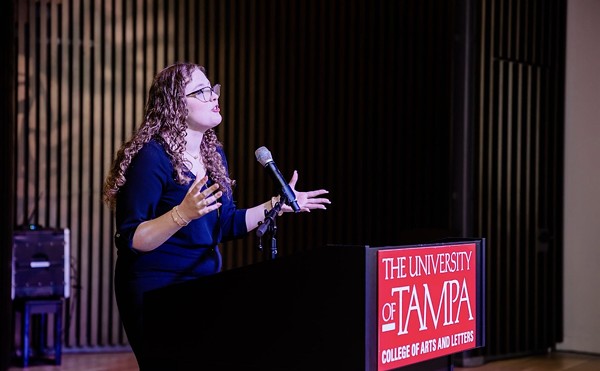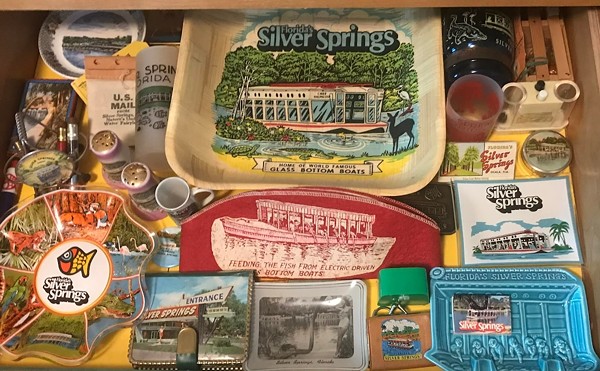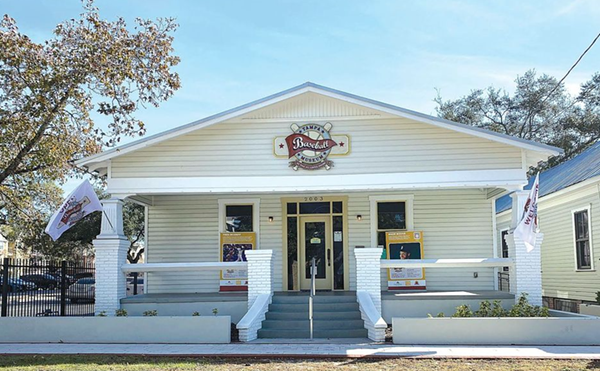The first question that Bay area residents might have about Anna in the Tropics is, does it get Ybor City right? After all, everyone knows by now that the 2003 Pulitzer Prize-winner in drama is set in Tampa's historic Latin Quarter, and more particularly, among the cigar-makers who flourished there in the 1920s. And one may even have heard that a key figure in the play is a "lector," that is, one of those factory employees whose job was to read news and literature to the rollers and stuffers and wrappers who otherwise might have been bored out of their minds. All right, not many of us can say what Ybor was like in 1929, but does the drama feel right? Has author Nilo Cruz, a Cuban-American himself, captured the Ybor we think we know?If the current American Stage version of the play is any indicator, the answer is a resounding yes. This splendidly successful production brings us an Ybor so immediate, you can smell the tobacco. This is a world dominated by cigar-making, fraught with love, lust and jealousy, and inhabited by passionate people who gamble on cockfights and each other's fidelity. Watching the American Stage Anna, you can't help but feel that Ybor City is worthy not only of high drama, but also of several steamy films and a few supercharged grand operas. Isn't Bizet's Carmen set among Spanish cigarette-makers? Well, it's not a long way from Carmen to Conchita, from Don José to Palomo, from Escamillo to Juan Julian. And Anna, for all its occasional flights into florid language, is a thousand times more credible than Bizet's famous melodrama. An abandoned wife, a handsome lector: surely this connection was made from time to time. And did the lovers, when they passed on Ybor's Broadway, pretend not to know each other? And in what corners of the district did they unite for their furtive trysts?
The story Anna tells is about the sisters Conchita and Marela, their parents Santiago and Ofelia, their Uncle Cheché, Conchita's husband Palomo, and the lector Juan Julian. When Juan Julian begins his employment in Santiago's family factory, Conchita and Palomo are at odds over Palomo's love affair with an unnamed third party. Conchita's resolve to take a lover in revenge is strengthened by Juan Julian's daily readings from Anna Karenina; what Tolstoy intended as a cautionary tale, Conchita — and Marela also — interpret as a spur to female lust. With just a little encouragement, Conchita and Juan Julian become lovers. But there are, of course, complications: Marela's own yen for Juan Julian, and Cheché's angry cognizance that it was a lector who ran off with his own beloved wife, Mildred. As Palomo learns of his wife's affair, and Cheché struggles with his own desire for Marela, emotions become dangerously heightened. What follows is perhaps a bit exaggerated, but it's convincing nonetheless. Anna, it seems, is just too hot for the tropics.
And the American Stage version is too fine for faint praise. The key player here is the director Todd Olson: you just have to love everything he's done with Anna, from his brilliant casting to his expansion of a rather efficient script into a deeply felt, emotionally logical series of colorful events. And then there's the acting, featuring one terrific performance after the next. Joseph Parra is a wonderfully comic Santiago, Jorge Acosta's Cheché is as boisterous as an oft-defeated man can be, and Giesha Otero as Ofelia is a vivacious older woman whose joie de vivre keeps her young, and whose high spirits no other character can match. Then there's Joe Masi as Juan Julian: a Valentino of lectors, attractive, quiet-spoken, and quick to capitalize on a sexual advantage. As his lover Conchita, Karen Garcia is irresistible: beautiful, self-possessed and strangely faithful to her husband even when another woman would (with good reason) have given up on him. Finally, Jessica Pimentel as younger sister Marela couldn't be better; the scene in which she makes a pass at Juan Julian is painfully embarrassing. Only Jose Antonio as Palomo doesn't entirely convince; we never really understand his hold on his wife, or how he could risk leaving her — engaging as she is — for another woman. But Jeff Dean's set, of the interior of a small cigar factory, is wholly persuasive, and Amy J. Cianci's costumes are just right for this place and time. The sound design — expressive guitar music between scenes — sets and sustains the mood powerfully.
Anna is not, I think, a great play; for all its lyricism and emotion, it's too lacking in ideas to stand with really important dramas. But this is a superb production nonetheless, and that, it seems, is no accident. Anna in the Tropics continues, into a new season, the quality work that Todd Olson brought with him to St. Petersburg when he became American Stage artistic director more than a year ago. There are theaters — for example, Florida Studio Theatre and the Asolo in Sarasota — that always put on top-notch productions, regardless of the quality of script. It's now clear that American Stage, under Olson's attentive leadership, has become one of those theaters. I expect quality work before I even get to my seat, and time and again that's what I find. It should go without saying that it's a delight to attend plays at a theater with this consistency.
If you want to see what I mean, buy a ticket to Anna in the Tropics. This is a potent, moving play in a first-class production. And of course, it has special meaning for Bay area residents, for whom Ybor City is just around the corner.
If you care about good theater — or if you're just interested in local history — you won't want to miss it.
DISJUNCTIVE DANCERS: The New York-based dance company Freefall is in the Bay area for the next couple of weekends, and they're offering a provocative, if not always successful, concert. If you've got the patience, there's some impressive material here.
The better section of the spectacle is Act Two, entitled "Homage." This is a piece in five different segments, and though it's difficult to figure out how they all hang together, some individual moments are precious. For example, in "a short piece about war," dancer Lynn Brown (a man) delivers General George Patton's opening speech from the movie Patton, while commenting on its more bloodthirsty attitudes with movements so exaggerated he seems an escapee from a disco asylum. Then there's "a short piece about justice," in which the movie Twelve Angry Men plays on a TV, the theme song from The Good, the Bad, and the Ugly whistles through the loudspeakers and, in one particularly eloquent vignette, Lynn Marie Ruse, seated, prevents Brown, on the floor, from rising up. Also pleasing is the lovely "Dedication," in which Brown and Ruse, together with Lorelei Bayne, shuffle rhythmically but asymmetrically around the stage while The Mamas and the Papas croon "This Is Dedicated to the One I Love."
Act One is not so satisfying. It's called "A Play of Few Words," and is a kind of tribute to Samuel Beckett's idea of people in garbage cans, set, oddly enough, to music from the Brecht/Weill Threepenny Opera. This disjunction — Beckett's desolation and Brecht/Weill's busy urban irony — never really makes sense. Uninspired, too, are the rather predictable ways the dancers use the three metal cans onstage — rolling them, entering them, sitting on them, walking over them. You'd never guess, watching Act One with its few insights, just how imaginative and gratifying Act Two is going to be. "Homage," disjointed as it is, still has irony, suggestiveness, humor; "Play of Few Words" comes across as a soulless exercise.
Still, I'm glad I saw "Homage," certain images of which will stay with me a long time. And now I'm a fan of Freefall. I look forward to seeing these artists again, in further — and more conceptually unified — presentations.



















